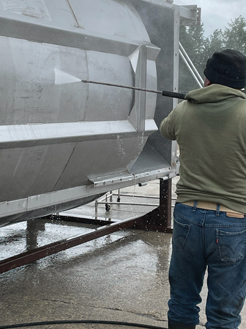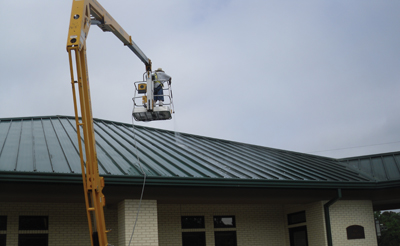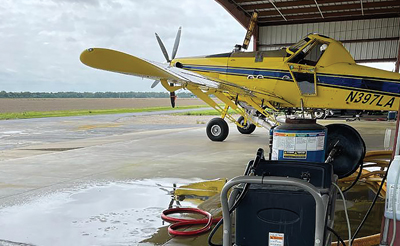
Cleaning Coast to Coast
Pressure Washing in Arkansas
By Terri Perrin / Published July 2021

This is the first in a series of state profiles highlighting the opportunities, advantages, and challenges of the pressure washing industry across the USA.
Located in the south-central region of the USA, the state of Arkansas is home to about three million people. The most populous cities are Little Rock (the capital city), Fort Smith, Fayetteville, Springdale, and Jonesboro.
The name “Arkansas” comes from the Native American Quapaw word “akakaze,” which means “land of the downriver people.” It covers a geographical area of over 53,000 square miles and is renowned for having some of the country’s most stunning and diverse geography, earning it the nickname “The Natural State.” Arkansas boasts rich farmland, Hot Springs National Park, the Ozark and Ouachita Mountains, river valleys, forests, and over 600,000 lakes. Natural beauty aside, this state is also a major business hub with Wal-Mart, Tyson Foods, J.B. Hunt, Dillard’s, Maverick Transportation, and Cal-Ark Trucking all headquartered here. It also boasts a vibrant and successful pressure washing industry with manufacturers, distributors, and service providers all working together to advance the industry statewide and, in some cases, worldwide.
Pressure Washing Opportunities
Brad Frost, the owner of Arkadelphia, AR-based Sud n Clean Power Washing, started his business in 2009 after being laid off from a job at a local factory. After several months of research, he began providing pressure washing services for the poultry industry and later expanded into some exterior residential work. Frost feels that when you are in the service industry, you provide a service that people don’t want to—or can’t—do themselves, and power washing poultry barns is one of those services. He had identified
a lucrative and steady niche market for his business. In addition to opportunities in the residential, commercial, and agricultural business sectors, two oil refineries, trucking, timber management, logging, sawmills, and paper mills present other possibilities for fleet washing and more.
“In the residential area, business picks up in March and continues until the late fall,” explains Frost. “Agricultural cleaning contracts are year-round. The poultry industry is huge in Arkansas. The state is the third-largest broiler producing state in the USA and the major supplier to McDonald’s restaurants. [You may be surprised to know that Arkansas is also the number one rice producer in the USA!] An aerial view of the northwest part of the state on Google maps shows poultry production facilities everywhere. Every 10 weeks, the barns’ fan systems need cleaning in preparation for new livestock to arrive … it keeps me busy!”
Jimmy George, the owner of PSI Equipment, a Hotsy and Mi-T-M pressure washer distributor based in Springdale, AR, says, “Seasonally, we never slow down. Arkansas has a fairly mild climate. If we do get inclement weather episodes, they are relatively short, so we are able to provide pressure washing service year-round. In addition to a massive agricultural industry, most homes have decks and, in this moist climate, all those decks need washing on a yearly basis. That fuels the contract cleaning base.”
Frost reports that some contractors choose to provide statewide services or venture into neighboring states. For Frost, however, sticking with contracts closer to home (and to his two core services) has proven to be the best option. Service providers considering expansion outside of their geographic service area need to be aware of, collect, record, and remit taxes from each state … as well as the 75 counties in Arkansas. This adds to time spent doing bookwork. Your bookkeeping program (and your accounting skills) must be able to accommodate the extra work.
“Fuel prices and maintenance are also a concern, and I’ve started charging mileage,” adds Frost. “For example, I’ve had to pay extra attention to the suspension on my vehicle because of all of the gravel roads I travel on. I’ve had my pressure washer frame welded several times because it has cracked due to the rough roads. These increased maintenance costs also need to be built into the pricing.”
David Grappe is a general manager at Whiting Systems, which is headquartered on a 13-acre property in Alexander, AR. Whiting manufactures and services large automatic wash systems for trucks, trains, and buses in many industries all over the world. (Something that might surprise Cleaner Times’ readers!) They also blend all of their own cleaning detergents and distribute all of their products throughout the country.
“Our rural areas are sparsely populated with individuals who purchase and utilize pressure washers,” says Grappe. “And, as with all of the USA, state and city regulations governing the requirements to wash vehicles, equipment, and other machinery may vary. In Arkansas, it is mandatory to install an oil-water separator and/or a wastewater reclamation system.”
Grappe explains that one of the greatest challenges they incur on a daily basis is the distance between customers in the rural areas of Arkansas. “Windshield time” is unproductive. “As we cover each area of the state, we try to see as many customers and prospects as possible in a day. With an average of 56 people per square mile in the state, this means that sometimes there are fewer than 10 people per square mile in some areas. We try to have extra supplies, soap, degreaser, and parts on our sales/service trucks when we head out each day. All of our pressure washer salesmen are very knowledgeable when it comes to diagnosing and repairing almost any brand of pressure washer. This gives us an advantage in our market because, nine times out of ten, we can make the necessary repairs at the customer’s location and have them washing again on the same day.”
“For PSI Equipment, it is all about customer service, and we concentrate on supporting our local service area,” adds Jimmy George. “The biggest challenges in the industry right now are the availability of parts and supply chain distribution disruptions due to many global factors. [The COVID-19 pandemic being one of them.] It is a “one-world market.” What’s happening in other countries affects us. However, because we have a large inventory, it provides a buffer, and this gives us a huge advantage. Price isn’t a factor — availability is. Having parts and products readily available is the most important thing.”
Manufacturing Point of View
Angie Farley-Thurman is president of Farley’s Inc., a small family owned manufacturing company in Siloam Springs, AR. Established in 1979 by Bob and Ethelyn Farley, Farley’s Inc. is now an industry leader in the manufacture of coils for all known makes of pressure washers. They also manufacture several models of high-quality pressure washers and burners that serve both the industrial cleaning and the oil and gas industries, plus they stock a full line of parts and accessories.
“We don’t sell to the general public—only to distributors—and the state of Arkansas represents only about 10 percent of our sales,” reports Farley-Thurman. “While we manufacture for a global distributor base, we remain headquartered here because this is where my parents were born and raised, and this is where they wanted to have their business. We stay because we love it here!
“This region has been a mecca for the pressure washing industry, starting in the 1960s and ‘70s, with companies like Citation. Farley’s, Whitco, and Delco were spin-offs when Citation closed. These brands are still key industry players,” adds Farley-Thurman. “Overall, people in Arkansas have a really good work ethic, and we are grateful to have excellent employees. This is what any business needs. There are also lots of small business programs at the University of Arkansas and throughout the state. For us, particularly, being next to the state of Oklahoma ensures another region to draw skilled workers from.”
Farley-Thurman adds that she feels that Arkansas’s municipal and state governments are pro-business. The taxes, she says, may not be the lowest in the country, but they are reasonable. “This provides us with good roads and schools. Our biggest draw is the cost of living is very reasonable. [Based on a U.S. average of 100, Arkansas is rated at 79.] It is such a great area to live and raise a family. People who have not been here would be surprised by how beautiful it is!
“Transportation is also, of course, of paramount importance to any manufacturer/distributor, and Arkansas’s location is ideal,” remarks Farley-Thurman. “The state is bordered by Missouri, Tennessee, Mississippi, Louisiana, Texas, and Oklahoma. Interstate 40 runs through the middle of the state and, in the Northwest, Highway 412 is one of the busiest highways in the state. For trucking lines, Fort Smith is close to us. This helps us deliver our light truck load (LTL) small loads to multiple customers.
“From a business perspective, there is a wide array of opportunities in Arkansas,” concludes Grappe. “From a personal perspective, outdoor sports such as fishing, hunting, water sports, hiking, and biking are some of the greatest ways to see the Natural State. The thing I love about this region is being 20 minutes from the delta in one direction, 20 minutes from the foothills and mountains in one direction, and 20 minutes from the pine forests and hardwood forests in the other direction. Arkansas is a great place to be!”








